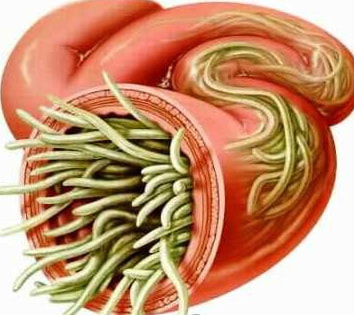 Threadworm Infection Threadworm infection may present with symptoms such as watery diarrhea, bloody stool, abdominal pain and pneumonitis. Immunocompromised patient may present with hyperinfection syndrome due to larvae of the threadworm which disseminated to organs such as lung, heart and central nervous system. Threadworm is also known as nematode roundworm which present in the intestine. The common mode of transmission is from the skin penetration of the fillariform larvae in the contaminated soil with human feces. On examination of the stool, larvae is detected. Adult threadworm will develop in the small intestine and produce eggs. Eggs will hatch in the intestine and may penetrate the intestine which lead to secondary bacterial infection due to internal autoinfection. External autoinfection may occur due to the contamination of the perianal region by the larvae. The common complication may include secondary bacteria infection induced sepsis. The treatment for threadworm infection may include wearing shoes , proper disposal of the human waste and medication which include ivermectin, mebendazole and thiabendazole.
0 Comments
Leave a Reply. |
Kembara's Health SolutionsDiscovering the world of health and medicine. Archives
June 2023
Categories
All
|

 RSS Feed
RSS Feed